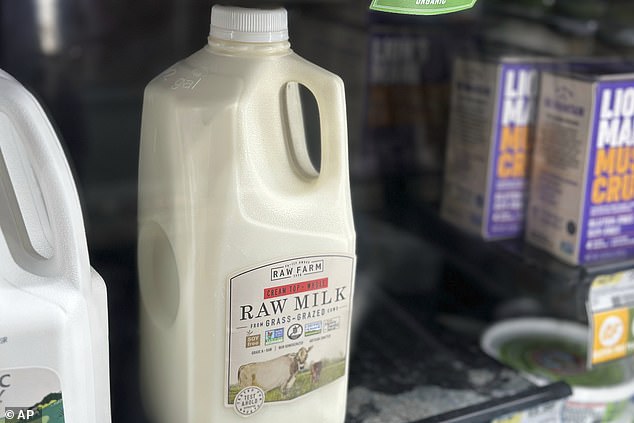Health authorities have called for mandatory testing of the country’s raw milk supply amid bird flu fears.
The United States Department of Agriculture (USDA) announced Friday that companies that handle raw milk, which has not gone through measures to kill bacteria called pasteurization, must collect and share samples of the products upon request.
The measure, called the National Milk Testing Strategy, aims to identify which dairy herds are infected by H5N1 (bird flu), which has caused an outbreak in more than 700 herds in 15 states.
The disease has also sickened 58 Americans, according to the CDC, meaning those who worked on dairy farms and were exposed to infected animals.
Arizona reported its two most recent infections in poultry workers on Friday.
Dairy herd owners with cattle that test positive for bird flu will also be required to provide information to help authorities with surveillance.
Testing will begin on December 16 and the initial launch will include six states: California, Colorado, Michigan, Mississippi, Oregon and Pennsylvania.
The announcement comes after the bird flu virus was detected in unpasteurized milk in California last month, prompting food safety experts to issue an “urgent warning not to drink.”
The USDA will require companies that handle raw milk to submit product samples upon request to identify dairy herds spreading bird flu.
Agriculture Secretary Tom Vilsack said in a news release: “Among many outcomes, this will give farmers and farmworkers greater confidence in the safety of their animals and their ability to protect themselves, and put us on the path to quickly control and stop the virus. ‘It spread throughout the country.’
Raw dairy products have not been pasteurized, a process that kills disease-causing germs by heating the milk to a high enough temperature.
While sales have been banned or restricted for decades for health reasons, they have benefited in recent years from a growing demand for organic products, with at least 4.4 percent of Americans (nearly 11 million people) trying raw milk every year.
Raw milk carries an inherently high risk of foodborne illnesses that the high-temperature pasteurization process helps eliminate.
The FDA’s long-standing recommendation regarding the consumption of raw milk is that it is considered a “high-risk food” due to these factors.
However, the government agency notes that ‘based on the limited research and information available, we do not know at this time whether (bird flu) can be transmitted to humans through consumption of raw milk and products made with raw milk from infected cows. ‘.
Similarly, the CDC warns that “unpasteurized (raw) milk and products made with raw milk, including soft cheese, ice cream, and yogurt, can be contaminated with germs that can cause serious illness, hospitalization, or death.” “.
Last month, California health officials detected bird flu in several batches of raw milk from a local dairy farm.
Earlier this week, the California Department of Public Health announced a recall of raw milk and cream from the farm on store shelves. No cases of human avian flu have been linked to these products.
Symptoms in humans so far have been mild and most often include conjunctivitis, coughing and sneezing.


